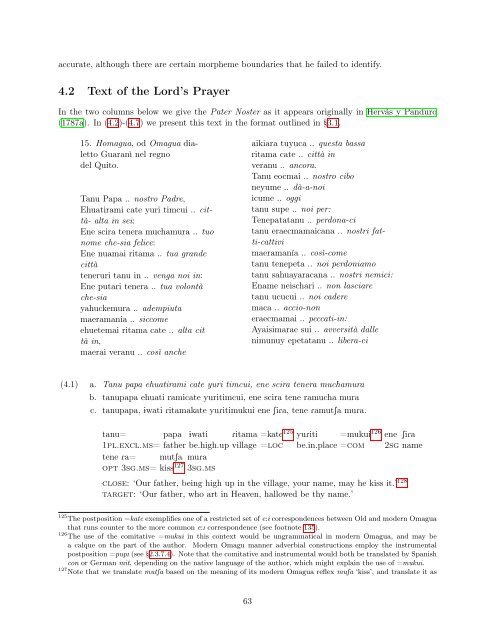draft manuscript - Linguistics - University of California, Berkeley
draft manuscript - Linguistics - University of California, Berkeley
draft manuscript - Linguistics - University of California, Berkeley
You also want an ePaper? Increase the reach of your titles
YUMPU automatically turns print PDFs into web optimized ePapers that Google loves.
accurate, although there are certain morpheme boundaries that he failed to identify.<br />
4.2 Text <strong>of</strong> the Lord’s Prayer<br />
In the two columns below we give the Pater Noster as it appears originally in Hervás y Panduro<br />
(1787a). In (4.2)-(4.7) we present this text in the format outlined in §3.1.<br />
15. Homagua, od Omagua dialetto<br />
Guaranì nel regno<br />
del Quito.<br />
Tanu Papa .. nostro Padre,<br />
Ehuatirami cate yuri timcui .. città-<br />
alta in sei:<br />
Ene scira tenera muchamura .. tuo<br />
nome che-sia felice:<br />
Ene nuamai ritama .. tua grande<br />
città<br />
teneruri tanu in .. venga noi in:<br />
Ene putari tenera .. tua volontà<br />
che-sia<br />
yahuckemura .. adempiuta<br />
maeramania .. siccome<br />
ehuetemai ritama cate .. alta cit<br />
tà in,<br />
maerai veranu .. così anche<br />
aikiara tuyuca .. questa bassa<br />
ritama cate .. città in<br />
veranu .. ancora.<br />
Tanu eocmai .. nostro cibo<br />
neyume .. dà-a-noi<br />
icume .. oggi<br />
tanu supe .. noi per:<br />
Tenepatatanu .. perdona-ci<br />
tanu eraecmamaicana .. nostri fatti-cattivi<br />
maeramanía .. così-come<br />
tanu tenepeta .. noi perdoniamo<br />
tanu sahuayaracana .. nostri nemici:<br />
Ename neischari .. non lasciare<br />
tanu ucucui .. noi cadere<br />
maca .. accio-non<br />
eraecmamai .. peccati-in:<br />
Ayaisimarae sui .. avversità dalle<br />
nimunuy epetatanu .. libera-ci<br />
(4.1) a. Tanu papa ehuatirami cate yuri timcui, ene scira tenera muchamura<br />
b. tanupapa ehuati ramicate yuritimcui, ene scira tene ramucha mura<br />
c. tanupapa, 1wati Ritamakate yuRitimukui ene SiRa, tene RamutSa muRa.<br />
tanu= papa 1wati Ritama =kate 125 yuRiti =mukui 126 ene SiRa<br />
1pl.excl.ms= father be.high.up village =loc be.in.place =com 2sg name<br />
tene<br />
opt<br />
Ra=<br />
3sg.ms=<br />
mutSa muRa<br />
kiss 127 3sg.ms<br />
close: ‘Our father, being high up in the village, your name, may he kiss it.’ 128<br />
target: ‘Our father, who art in Heaven, hallowed be thy name.’<br />
125 The postposition =kate exemplifies one <strong>of</strong> a restricted set <strong>of</strong> e:i correspondences between Old and modern Omagua<br />
that runs counter to the more common e:I correspondence (see footnote 135).<br />
126 The use <strong>of</strong> the comitative =mukui in this context would be ungrammatical in modern Omagua, and may be<br />
a calque on the part <strong>of</strong> the author. Modern Omagu manner adverbial constructions employ the instrumental<br />
postposition =pupI (see §2.3.7.4). Note that the comitative and instrumental would both be translated by Spanish<br />
con or German mit, depending on the native language <strong>of</strong> the author, which might explain the use <strong>of</strong> =mukui.<br />
127 Note that we translate mutSa based on the meaning <strong>of</strong> its modern Omagua reflex muSa ‘kiss’, and translate it as<br />
63
















